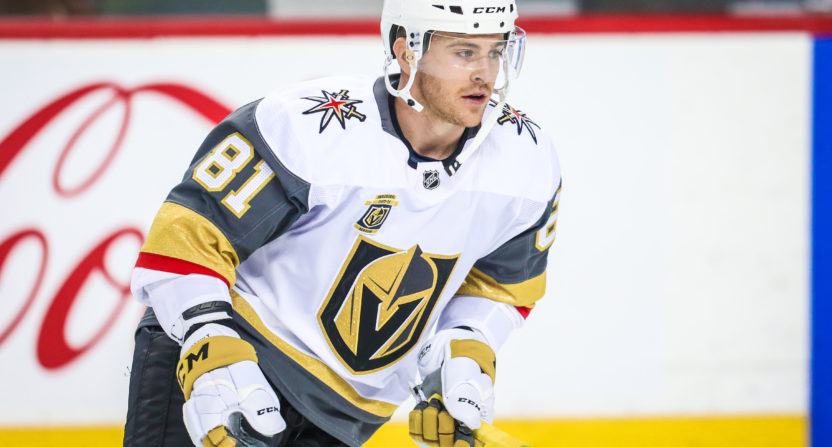It’s that time of the year where the NHL regular season comes to a close. With it, offseason and midseason moves – whether small or risky – can be further dissected and ultimately put down for either helping or hurting the teams involved.
During the 2017-18 season, some moves paid off huge. Others, meanwhile, sunk teams’ playoff chances, and left fans asking why.
Best/Worst Move
The Florida Panthers surprisingly expose leading goal-scorer Jonathan Marchessault in the expansion draft, who’s picked up by the Vegas Golden Knights. In a corresponding move, Florida traded forward Reilly Smith to Vegas for a fourth-round pick.
Acquiring Marchessault and Smith was unquestionably a home run for the Golden Knights and a complete whiff by Dale Tallon and the Panthers.
The expansion Golden Knights had a historic first season in Vegas, finishing atop the Pacific division with 109 points. Smith and Marchessault were huge catalysts in sparking one of the league’s best offenses. The 27-year-old Marchessault scored at a near point-per-game pace, with 27 goals and 75 points in 77 games, while the 27-year-old Smith had his most productive season, notching 22 goals and 60 points in 67 games. Both exceeded expectations and were cemented among the Golden Knights’ potent top-six.
As for Florida, exposing Marchessault was a huge mistake – even if they didn’t want to extend him (he earned a $30 million contract in Vegas). Giving up your team’s best scorer for little return is bad. Giving him up for nothing is horrendous. And, while Smith’s departure is easier to swallow since he’s got four more seasons at $5 million per left on his deal, getting a single fourth-round pick isn’t enough to justify losing his production.
Florida missed the playoffs by a single point. You have to wonder how the team would have performed if it instead kept moving other pieces to save cap space and retain the duo.
Trading Marchessault and Smith might sting for Panthers fans, but just remember to “thank God” Dale Tallon, the man who let these deals happen, has full control of the roster.
Dale Tallon des @FlaPanthers: "Analytics took a more important place in the game. We made some mistakes… and thank god I'm back" #NHL100
— Claude-André Mayrand (@CAMayrand) November 17, 2017
Best Signing
Will Butcher: two-year entry level deal with the New Jersey Devils. Alexander Kerfoot: two-year entry level deal with the Colorado Avalanche.
It’s funny how Butcher and Kerfoot opted against signing with the Avs and Devils respectively, only to flip the script and sign with New Jersey and Colorado.
Both players were hyped college free agents, and unlike 99% of NCAA signings, Butcher and Kerfoot wildly exceeded expectations.
Butcher was an offensive dynamo as a first-year defenseman with the New Jersey Devils, scoring five goals and 44 points with 23 power play points. While he played sheltered minutes, Butcher’s offensive prowess shined and his smooth skating and puck handling skills translated perfectly to the NHL. The University of Denver alum outscored Oliver Ekman-Larsson, Nick Leddy, Aaron Ekblad and Zach Werenski. He provided a huge bang for the Devils’ buck. It could be argued the Devils miss the playoffs without Butcher.
Kerfoot was no slouch in Denver. The Harvard alum finished fifth on Colorado in scoring with 19 goals and 43 points in 79 games. The 23-year-old was useful on the power play (17 points) and provided much-needed depth for the top-heavy Avs. While the 23-year-old didn’t have as big of an impact as Butcher, he was one reason his team took a huge step forward this season and qualified for the postseason.
Worst Signing
Steve Mason: two-year, $8.2 million contract with the Winnipeg Jets.
I had thoughts about putting Vadim Shipachyov (two-year, $9 million contract terminated after three games), Nick Bonino (four-year, $16.4 million) and Karl Alzner (five-year, $23.1 million) ahead of Mason, but the Winnipeg Jets goaltender gets the nod solely because of how much he wasn’t needed.
Connor Hellebuyck was already primed to be the starting goaltender in Winnipeg but the Jets signed Mason as a worst-case scenario for the former. Mason was OK as a starter in Philadelphia the season before, but the Jets weren’t expecting him to unseat Hellebuyck – but provide stability behind him. What did they end up getting? A mediocre goalie, who posted blah numbers – five wins, six losses, a 3.24 GAA and a .906 save percentage in 13 appearances. That’s pretty much in line to what 2016-17 backup goalie Michael Hutchison – who is still under contract with Winnipeg – provided. With Hutchison and Eric Comrie fighting there way up, Mason’s not even guaranteed to be on the team next year.
The Jets did a lot of things right this offseason. However, giving multiple years and a high $4.1 million AAV for a goalie they didn’t need made little sense then and makes less sense now. At that rate, he’s unmovable. Not that one more year at that AAV will kill Winnipeg’s cap, but it will hurt their flexibility going forward. Mason’s deal is a small, but painful pill to swallow.







